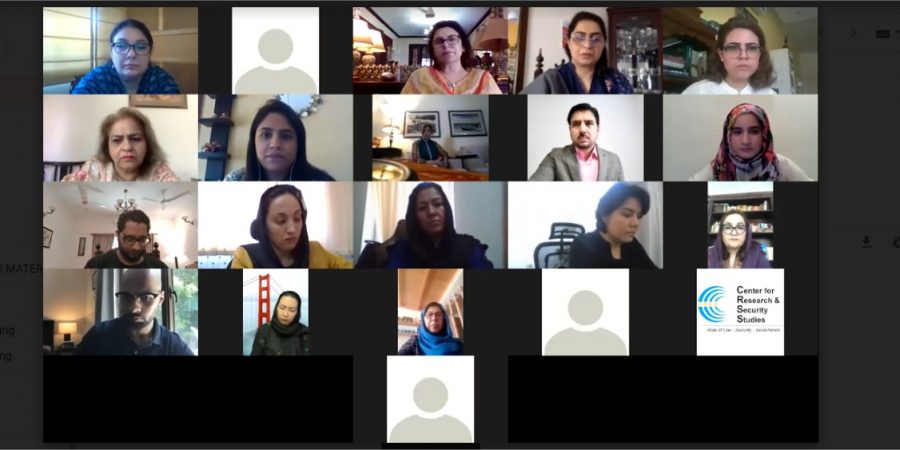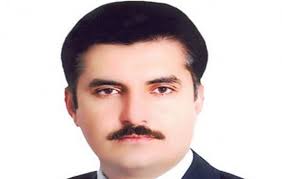Afghan women leaders seek technical assistance from Pakistan: CRSS Dialogue

ISLAMABAD, JUNE 15 (DNA) – Pakistan, to consolidate its positive overtures towards Afghanistan, has appointed former Ambassador Mohammad Sadiq as Pakistan’s special envoy to Kabul, a completely new office, to what the government describes will play an effective role in strengthening ties between the two nations. Sadiq is respected on both sides and has very cordial relations across the border, as well.
So, we can say, things are very much moving in the right direction, stated Mehnaz Akbar Aziz, Member of the Parliament, Pakistan, while speaking to distinguished Pak-Afghan delegates, in a virtual cross-border women’s dialogue on “Socio-Economic Impact of COVID-19 on Women in Pakistan and Afghanistan”. The dialogue was organized by Center for Research and Security Studies (CRSS), as part of its Pakistan-Afghanistan Track 1.5/II diplomacy – Beyond Boundaries.
Mehnaz also shared another encouraging news regarding Afghan President Ghani, who recently said that Afghanistan now has “the closest alignment” with Pakistan on the peace process and he also hoped that it would translate into cooperation in other areas as well.
Though, she was of the opinion that additionally appointing a woman co-ambassador or deputy ambassador would be a tangible gain. This would help in resolving women related issues across the border in a swift manner.
Commenting on the global pandemic, she said that for COVID-19 approaches to be responsive and to address the gendered impact, women must be at the center of COVID-19 recovery efforts.
This starts with women’s equal representation and participation in decision-making. She also suggested formulation of a Pak-Afghan working group on COVID-19.
Shinkai Karokhail, senior Afghan politician and rights activist, stated that COVID-19’s impact has doubled or tripled women’s responsibilities in Afghanistan and it will slow down the access of girls to education even more.
It is feared that because of the economic impact of COVID-19, families will further prioritize educating boys rather than girls, while the number of out of school children is feared to increase – especially the number of girls. Online learning is better than nothing, but it has created a digital divide.
People who have access to these devices can benefit, but the majority of the students in rural areas do not have access to computers or TVs and internet. The pandemic also added to the miseries of Afghan women, often working in informal sector.
Now, they are at verge of losing their jobs; a large number of which are widows. Besides that, these women also face physical and psychological abuse. She also recommended that a mechanism be devised for Afghan women entrepreneurs to learn from Pakistani business women the techniques of e-commerce.
Moreover, she added that the COVID-19 crisis represents an opportunity to empower women as key leaders and decision makers to respond effectively and to build longer-term resilience and social cohesion of communities. Lack of diversity and failing to leverage women’s expertise and talent in decision-making can limit an effective response.
Earlier, Imtiaz Gul, Executive Director CRSS, while welcoming the delegates stated that adding the women component in Beyond Boundaries is good way of building on what CRSS has been doing since 2015.
He opined that while the politics remains toxic and most of the leaders keep clinging to the baggage of history, we at the civil society should at least try to detach from official narratives. Instead, we should mine on positives, to generate significant goodwill and resolve bilateral issues together, in a positive environment, he added.
Muzammil Shinwari, who heads the organization for Economic Studies and Peace (OESP) – counterpart of CRSS in Afghanistan, enunciated that Pakistan has a good experience in distant learning such as Virtual University and Allama Iqbal Open University of Pakistan. Recently, Pakistan also started Tele-School amid pandemic. So, Kabul can get technical assistance from Islamabad regarding remote education.
Later on, after a comprehensive discussion on the socio-economic impact of COVID-19 on women in both countries, Ammara Durrani, who was moderating the session, along with CRSS team, penned the following joint policy recommendations, which were proposed by the delegates on both sides.
Formulation of a Pak-Afghan Bilateral Women Commission in which women leaders from all sectors come together to address and resolve current challenges faced by women in both countries through collaborative measures via this platform.
Considering the current COVID-19 situation, personal and household hygiene awareness needs to be raised by government agencies, media, civil society platforms and donor organizations. In addition, personal hygiene kits can be provided to those in need.
Furthermore, participants recommended that, as during the pandemic domestic abuse has been on the rise in both countries, females in Afghanistan can also avail the e-medical and psychotherapy services provided by Pakistan to get help and awareness on how to deal in this difficult time. Also, Afghanistan can also adopt the same model on their online platforms.
Representatives of Islamabad Women Chamber of Commerce & Industry (IWCCI) extended their offer to Afghanistan Women Chamber of Commerce & Industry (AWCCI) to provide e-commerce training services, particularly on how to digitalize businesses using online platforms to Afghan businesswomen in order to enhance their skill development and help expand their businesses.
Inclusion of women leaders/activists in the peace process for their first-hand representation as they constitute 46% of the Afghan population and can best voice their issues on their behalf. Currently, there is limited women representation in the peace process but the participants urged to increase the numbers as well as engage women activists from all sectors of the Afghan society. Furthermore, participants urged there should be women representation from the Taliban side as well in the intra-Afghan talks to include their voices.
Other Pakistani delegates included: Ambassador Tasnim Aslam, Former Special Secretary of the Ministry of Foreign Affairs; Samina Fazil, Founder and President of Islamabad Women Chamber of Commerce and Industry (IWCCI);D r. Shabana Fayyaz, Head, Department of Defense and Strategic Studies (DSS), Quaid-i-Azam University; Sameena Durrani, Senior Development Professional; Ammara Durrani, Public Policy and Human Security Expert; Amina Khan, Director, Centre for Middle East & Africa (CMEA) and Afghanistan, Institute of Strategic Studies Islamabad (ISSI); Mome Saleem, Development Professional and Consultant, PM Youth Programme and Samima Durrani, Development Professional and Independent Consultant. While Afghan delegates included: Shukria Barakzai, Former Ambassador to Norway; Fawzia Ehsani, Former Deputy Minister for Transport and Civil Aviation; Momina Yari, Former Commissioner, Afghan Independent Election Commission; Parwarish Oriakhail, Vice President, Afghanistan Women Chamber of Commerce and Industry (AWCCI); Parasto Yari, Senior Advisor to Minister for Peace; Ghazalan Koofi, Director General, Statistics Affairs; Freshta Zuhal Rahman, Commercial Attorney and Zahra Formuly, Media Representative (RTA).DNA
========
Related News

PPP always represents workers, deprived class: Kundi
DERA ISMAIL KHAN, MAY 01 (DNA) —Pakistan People’s Party (PPP) Central Information Secretary Faisal Karim KundiRead More

IMF move to release of the $1.1 bn tranche welcomed
ISLAMABAD, MAY 01 (DNA) —Chairman of National Business Group Pakistan, President Pakistan Businessmen and Intellectuals Forum,Read More


Comments are Closed